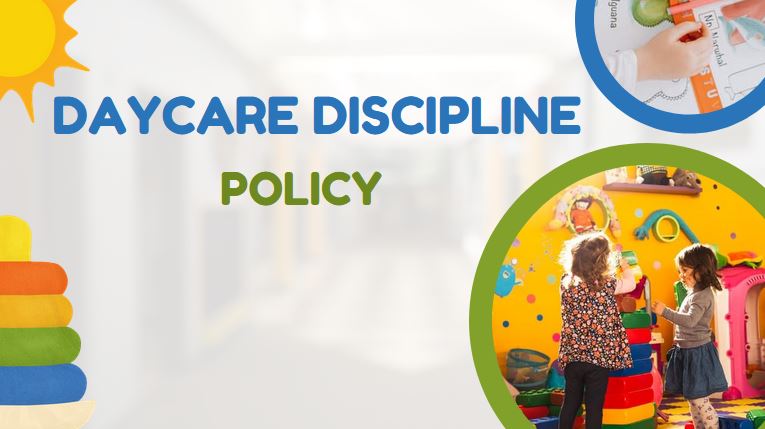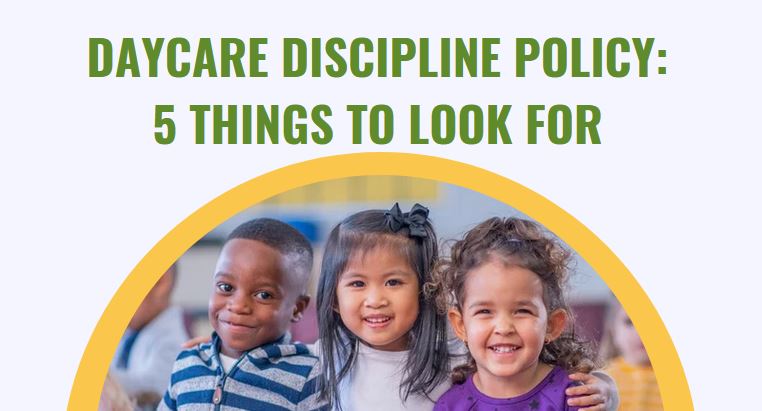
Finding the right daycare for your child involves considering various factors, from location to educational approaches, and one of the most crucial aspects to focus on is their discipline policy. Having a thorough understanding of a center’s method for discipline not only ensures your child’s comfort but also promotes a healthy learning environment and assists with their overall emotional and social development.
The Concept of Discipline in a Daycare Setting
Discipline is much more than managing undesirable behavior in a daycare environment. It’s a way to teach children self-regulation, emotional understanding, and acceptable social behavior. A daycare discipline policy embodies strategies and guidelines to promote a positive, respectful, and nurturing atmosphere for children to thrive, ultimately setting the stage for future interactions and development.
The basic principles of effective daycare discipline revolve around teaching children to make better choices and providing them with opportunities to learn from their actions and understand the consequences, all while nurturing their emotional well-being. This tends to include implementing clear rules and expectations, remaining consistent, using positive reinforcement, promoting open communication, and tailoring the approach to suit the unique needs of each child.
Daycare Discipline Policy: 5 Things to Look For

Children’s behavior is dynamic; even in a daycare scenario, they continue being authentic, sometimes boisterous selves. Care providers, thus, have the everyday challenge of managing disruptions, arguments, playful mischief, and occasional tantrums that collectively form part of a child’s explorative journey.
Optimum daycare centers, characterized by superior quality and unwavering safety, do not shy away from these behavioral challenges. These centers invariably have a constructive, comprehensive plan designed to address and rectify behavioral issues without dampening a child’s enthusiasm or hampering their emotional growth.
The initial daycare tour and subsequent interview offer a golden opportunity to inquire about the center’s discipline techniques. Relevant questions encompass their general philosophy around discipline, the use of timeouts, a protocol for handling disruptive behavior, strategies for communication over any problem, and their response to persisting behavioral issues.
As the daycare representatives provide insights about their disciplinary approach, we direct you toward the five essential elements that deserve your meticulous evaluation.
1. Clear Expectations and Rules
The foundation of any thriving daycare environment begins with clear expectations and rules. Children learn best when their world is structured around a steadfast routine and defined limits. These clear boundaries serve as invisible guides, channeling their youthful energy constructively while giving them a sense of security and predictability.
This is why your chosen daycare facility must articulate its rules and expectations without ambiguity. These guidelines should act as a beacon, illuminating the path of acceptable behavior for you and your child.
Moreover, these behavioral expectations should be effectively conveyed to the little ones. After all, without knowing what’s expected, a child cannot recognize and adhere to the pattern of desirable behavior. Hence, the importance of consistent enforcement – the principle that rules apply to everyone, strengthens the essence of fairness in their budding minds.
2. Positive Reinforcement and Encouragement

Discipline in daycare should never involve physical punishment, demeaning language, shaming, or degradation. These actions are antithetical to the care, respect, and encouragement that every child deserves, especially in an environment dedicated to their learning and growth.
It’s imperative that your daycare provider leans heavily on the pillar of positivity in their disciplinary approach. A well-implemented positive reinforcement strategy can transform behavioral management, making it more of a learning experience and less of a punitive exercise. This could manifest in various ways: rewarding good behavior, employing positive behavior charts, bestowing verbal praises, encouraging with high-fives, or even selecting a commendable ‘star student of the day.’ The crux is that your daycare provider should be able to articulate and manifest this belief in their everyday conduct clearly and meaningfully, thereby modeling discipline alongside nurturing positivity, respect, and self-esteem.
3. Graduated Consequences and Discipline Techniques
Consequences in daycares ensure that the approach is sensitive to the child’s age and developmental stage. Remember, when it comes to young children, discipline is about establishing safety and support while fostering emotional growth and development.
For infants and toddlers, it’s essential to redirect and assist them in dealing with their emotions and impulses. Gentle intervention, like firmly saying, “No, we don’t hit,” keeps them safe without punishment. Typical toddler behaviors, like tantrums or toy grabbing, require caregivers to help children manage everyday challenges, eventually guiding them toward maturity.
As children grow older, techniques like “time away” can be introduced, allowing them to cool down from conflict situations. However, extended removal or harsh reprimands are inadvisable as they can intensify behavioral issues and possibly indicate a lack of supportive tools within the daycare. Always be sure the daycare’s consequences and discipline techniques align with your child’s age and individual needs.
4. Communication with Parents
A fundamental factor in childcare is open and ongoing communication between parents and daycare providers, especially concerning discipline. Daycares must maintain an open-door policy, encouraging you to discuss any issues. This collaboration strengthens continuity in molding your child’s behavior in the center and at home.
Moreover, when behavioral issues persist, daycare caregivers should involve you directly, seeking your insight and collaboration. If required, they may suggest addressing the issue with a pediatrician or recommend an educational evaluation to pinpoint any underlying causes affecting behavior, such as hearing, vision, or language comprehension issues. Dysfunctional behavior may mask developmental struggles, and as a caregiver, it’s essential to provide additional support and resources for your child both in the classroom and at home.
5. Individual Child Recognition

Catering to individual needs forms the core of an effective discipline policy. It’s essential to view each child as a unique individual with specific strengths, challenges, and needs. Daycares that consider individual attributes can create a discipline policy customized to every child’s uniqueness. This nuanced approach allows daycare providers to connect with children meaningfully, effectively guide them through their journey, and promote a more fulfilled, balanced, and disciplined environment.
When evaluating daycares, look for signs of bespoke strategies tailored to children’s needs. This might include personalized behavior plans, enhanced child-teacher interactions, and differentiated rules or expectations. Daycares with such strategies demonstrate an understanding that children’s disciplinary needs vary, reinforcing the systematic and compassionate execution of their discipline policy. A daycare that recognizes and respects these individual needs will often be more successful in fostering positive, disciplined behavior.
Reflect on the Information You Receive
When considering the discipline policy of a daycare center, it’s essential to weigh the information you’ve received against your values and what you believe to be the best for your child.
- Consistency: Ensure that the policy applied by the daycare aligns with the disciplinary strategies you implement at home. Consistency across environments will support your child’s understanding of acceptable behaviors.
- Safety: The daycare center must prioritize physical and emotional safety when executing its disciplinary strategies.
- Respect for the child: The systems should focus on teaching and guidance instead of sheer punishment.
- Transparency: Clear communication on disciplinary actions helps avoid confusion and misunderstandings, providing a clearer picture of your child’s behavior at the center.
- Comfort level: You should feel comfortable and confident in the daycare’s approach to discipline and handling behavioral challenges.
Choosing The Right Daycare for Your Little Ones
In evaluating a daycare center’s discipline policy, ensuring that their strategies align with your family values and parenting style is paramount. Remember, the chosen daycare acts as an extension of your home, shaping your child’s formative years. Embrace this process, as it is through these rigorous evaluations, that you can have confidence your child is in an environment conducive to their growth, safety, and happiness.
We would like to draw your attention to Baby Steps Daycare, a respected daycare provider based in Queens, NY. Their approach to discipline is rooted in nurturing a child’s emotional, social, and cognitive growth. They employ:
- Positive reinforcement to encourage good behavior.
- Temporary, non-punitive separation for children experiencing adjustment problems.
- Firmly disallow corporal punishment, humiliation, or frightening methods under any circumstance.
- Ensuring all staff members are well-versed with and adhere to the discipline policy, providing a consistent childcare environment.
For further information and to view their facilities, feel free to call Baby Steps Daycare at 718-559-8717.

